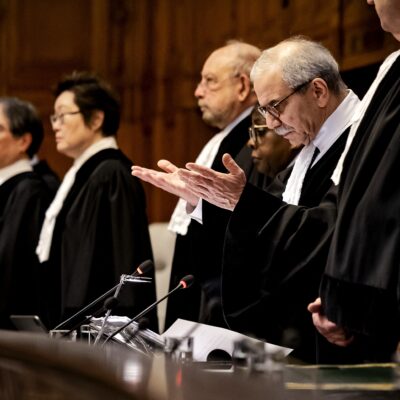Nonprofit tracking online antisemitism with AI tools details cyber aftermath of Israel-Hamas war
CyberWell CEO Tal-Or Cohen Montemayor said there’s been an 86% rise in online antisemitism since Oct. 7

CyberWell
CyberWell team
One of the newest companies monitoring antisemitism online is CyberWell, an AI-backed nonprofit that’s home to the first open source database of anti-Jewish digital hate. CyberWell’s executive director and founder, Tal-Or Cohen Montemayor, started the company about 18 months ago after growing increasingly concerned by the rapid migration of conspiracy theories and “violent antisemitism” from darker internet channels to mainstream social media.
“It’s very difficult to be Jewish, openly online today,” Cohen Montemayor said during an interview with Jewish Insider last month at Gregory’s Coffee in Midtown Manhattan. “We’re experiencing an unprecedented wave of hate.”
The company reported an 86% rise in antisemitic content across all platforms post-Oct. 7.
Cyberwell monitors for antisemitism in both English and Arabic, using the 11 categories detailed in the International Holocaust Remembrance Alliance working definition of antisemitism to determine a positive incident.
Once a potential instance is flagged by CyberWell’s AI systems, a human analyst vets each case before they are included in the final total. CyberWell collects everything from specific hashtags and trends to individual offending users, and publishes that information in a dataset on its website, as well as sending an exhaustive report to each social media platform, which include high level compliance alerts for their own content moderation teams so they have all the information needed to implement a change.
Cohen Montemayor, who is a lawyer by trade, got her start in the open source intelligence and business intelligence space, specializing in U.S. extremist movements and the dark web, before founding CyberWell. Certain trends the company has seen most recently include increased calls to violence against Jews in CyberWell’s Arabic dataset and an increase on the English side of what Cohen Montemayor called “classic antisemitic narratives,” such as that Jews control the government or the idea of Jewish power.
“I couldn’t help but be very alarmed as a student of history, and thinking about the Holocaust and how it happened, is primarily before the Holocaust could happen, the idea of hating Jews had to be popularized, and was popularized in traditional media, was popularized in academia.” Cohen Montemayor said. “When you see that happening now on these algorithmically empowered machines that bring over half of the worldwide internet activity, you can’t help but think that we’re on the precipice of a very similar violent event.”
Of the five main social media platforms CyberWell operates within — Facebook, Instagram, Tik Tok, YouTube and X, formerly known as Twitter — Facebook saw the highest rise in antisemitism after Oct. 7, with a 193% increase while X increased by 81% (although Cohen Montemayor described X as having a “higher level of baseline antisemitism because they don’t remove hate speech.”)
At the same time, Cohen Montemayor has also noticed a rise in denial of the Oct. 7 Hamas massacre across the board. Social media platforms don’t currently include the denial of the events of Oct. 7 in their hate speech policies, which CyberWell is lobbying to fix.
“I predict that this denial campaign will literally be the reincarnation of Holocaust denial. Only now it’s not going to be limited to academia, it’s going to be on algorithmically empowered machines,” she said.
Since Oct. 7, CyberWell has been tasked by the platforms it works with to expand beyond just monitoring antisemitism into watching for glorification of terror, graphic content, misinformation and disinformation. One of the main issues highlighted by the company’s newest report, however, is the failure of social media sites to actively monitor and remove violating content themselves.
Last month, Facebook’s content moderating decisions were overturned more than once by parent company Meta after the platform removed two videos (and later a handful of posts) that showed scenes from the Oct. 7 massacres, initially deemed by the platform as being in violation of Meta’s policies regarding sharing videos of a violent nature. Meta’s Oversight Board said the posts should have been allowed and that Facebook’s tightened removal policy was too severe.
“I wish that there wasn’t a reason for [an] online antisemitism expert to exist like CyberWell. It’s a need,” Cohen Montemayor said. “Objectively speaking, today, there is not only a 300% increase of incidents outside, there’s a doubling and tripling of the levels of online antisemitism, and social media platforms, the Jewish community cannot expect them to be antisemitism experts.”
“It’s such a nuanced form of hate that you need somebody who brings that knowledge about antisemitism and Israel, and also brings technology in order to solve this issue at scale.”










